Junto a la sandía, el melón es una de las frutas que más agua contiene; por ello, resulta ideal para refrescar los calores del verano, coincidiendo con que es el fruto estrella de la temporada. Hoy te proponemos una papilla de melón para bebés, pero también puedes, simplemente, triturar la pulpa o aplastarla con un tenedor. También podrás preparar un helado casero con ella; calmará los dolores de los dientes de leche y tu bebé disfrutará mucho mientras come.
El melón tiene pequeñas cantidades de proteínas y grasas, y un 8% de hidratos de carbono de absorción rápida. Contiene betacaroteno (en más cantidad cuanto más naranja es su pulpa) y vitamina C: una pequeña porción cubrirá las necesidades diarias de esta vitamina en bebés y niños pequeños.
¿Un atajo? ¡Oído cocina!
Un bebé puede comer melón desde tan pronto como a los 6 meses de edad, coincidiendo con la introducción de la alimentación complementaria. Puede ofrecerse cortado, en puré, papilla, sorbete o zumo, solo o combinado con otras frutas.
Al tratarse de una fruta cuya pulpa —cuando está madura— resulta súper dulce, no se aconseja ofrecer al bebé más de 2 o 3 veces por semana. De lo contrario, el paladar del niño podría acostumbrarse al intenso dulzor y esto aumentaría la posibilidad de rechazo hacia otros sabores y alimentos.
Por cada 100 gramos de melón, tu bebé obtiene:
Papilla de melón para bebés
Ingredientes:
Opcionalmente puedes agregar otras frutas, como por ejemplo manzana o pera, y un poco de leche materna, de fórmula o de continuación.
Elaboración:
Esta papilla de melón para bebés es perfecta como desayuno, merienda o postre. Como te comentaba al principio, el melón resulta ideal para hacer un helado saludable y refrescante para los más pequeños; puedes encontrar más ideas sanas en nuestros especiales helados para bebés y helados para niños. Y si buscas más opciones, echa un vistazo a nuestro recopilatorio de purés de fruta para bebés.
El melón es una fruta rebosante de agua, con propiedades depurativas y refrescantes. Se caracteriza principalmente porque además de ser una deliciosa fruta fresca, contiene beneficios y propiedades que la convierten en una buena opción para mitigar el calor.
1. Hidratante: una de las principales propiedades del melón es que contiene un 90 % de agua, ideal para hidratar a niños y embarazadas en épocas de verano, además es refrescante y diurética.
2. Ayuda al crecimiento y desarrollo del bebé: el melón contiene ácido fólico (vitamina B9), esta vitamina es esencial antes y durante el embarazo porque ayuda a la multiplicación y la renovación de las células, y sobre todo a la formación de nuevos tejidos, los órganos del futuro bebé crecen rápidamente. También los niños deben consumir alimentos que contengan ácido fólico porque es importante para su desarrollo y el crecimiento.
3. Fortalece el sistema inmune: el melón contiene citrulina (un aminoácido no esencial) que ayuda a fortalecer el sistema inmune, ayuda a la cicatrización de heridas, ideal para niños y embarazadas que necesitan mantener sus defensas fuertes.
4. Ayuda a la visión: otro de los nutrientes que contiene el melón son betacotenos (precursor de vitamina A), es un antioxidante que produce pigmento en la retina del ojo, por lo tanto consumir melón es excelente para mejorar la visión.
5. Ayuda al crecimiento: los betacarotenos (precursor de vitamina A), junto a la vitamina C que contiene el melón, ayudan a la formación y al mantenimiento de dientes, tejidos blandos y óseos.
Ayuda al crecimiento: los betacarotenos (precursor de vitamina A), junto a la vitamina C que contiene el melón, ayudan a la formación y al mantenimiento de dientes, tejidos blandos y óseos.
6. Ayuda a la digestión: el consumo de fibra en niños y embarazadas a veces se ve disminuido, el melón es rico en fibra que absorbe el agua atravesando el sistema digestivo, lo cual hace más voluminosas las heces. El paso de las heces por el intestino se acelera, reduciendo así los daños que producen las materias fecales en contacto con las paredes del colon.
7. Ayuda a la concentración, al funcionamiento del sistema nervioso y la formación de membranas celulares: las semillas que contiene el melón son ricas en omega-3. El omega 3 es una grasa poliinsaturada que debe consumirse en mayor cantidad durante el embarazo para conseguir que el feto tenga un desarrollo cerebral adecuado, de igual manera se sabe que los omega 3 ayudan a la coordinación motriz de los bebés y a mejorar la concentración en los niños.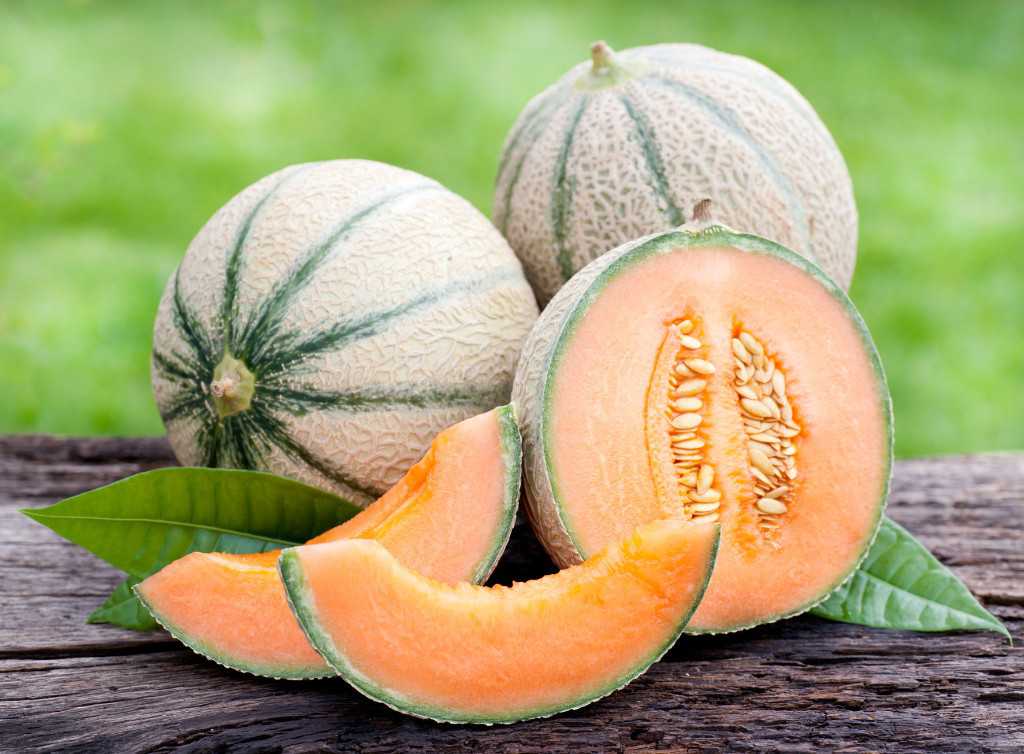
8. Protector contra ciertas enfermedades: al contener ácido fólico, ayuda a la prevención de ciertas enfermedades como ciertos cánceres, enfermedades cardiovasculares, el alzheimer y algunos tipos de depresiones.
Aprovecha el verano para consumir esta fruta fresca con tantos beneficios, ya sea entre horas o de postre, puedes consumirlo en diversas recetas como sorbetes, melón con salmón o jamón, en ensaladas, helados, gelatinas, granizados, gazpacho, etc.
Puedes leer más artículos similares a Beneficios del melón para niños y embarazadas, en la categoría de Dietas – menús en Guiainfantil.com.
. Benefits, harms, calories and more
Updated on September 12, 2022, 07:25
Shutterstock
This is a low-calorie sweet fruit that is rich in nutrients. What is useful and harmful melon – we find out together with an expert.
Content
nine0002 Unsplash
Melon is a gourd that grows in warm and humid climates.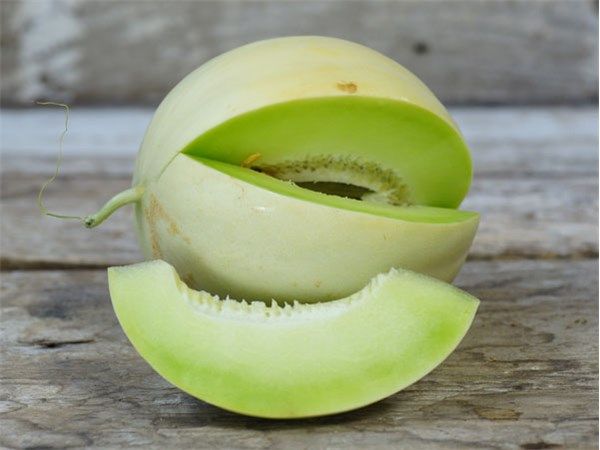 The period of its maturation can take from two to six months. There are a large number of different varieties of melons: honey, collective farmer, torpedo, cantaloupe, kassaba, Turkmen and others. They differ in skin and flesh color, ripening speed, growing location, weight, taste and shape.
The period of its maturation can take from two to six months. There are a large number of different varieties of melons: honey, collective farmer, torpedo, cantaloupe, kassaba, Turkmen and others. They differ in skin and flesh color, ripening speed, growing location, weight, taste and shape.
In Russia, you can find melon on the counter already from the end of July – the beginning of August, the sales season lasts most often until October. nine0003
Unsplash
A small portion of melon weighing approximately 200 g contains [1]:
Melon contains many nutrients. They help strengthen bones, improve the condition of the skin, the immune system. Melon can also help lower blood pressure and blood sugar. nine0003
Melon fruits and seeds contain vitamins, minerals and beneficial compounds that help the proper functioning of various body systems.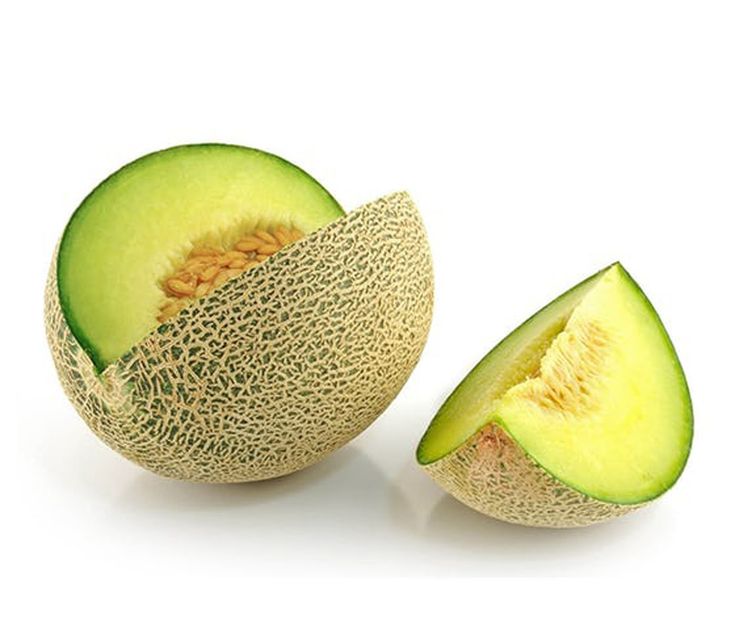
For a 200 g portion of melon:
Melon also contains antioxidant compounds that protect cells from harmful substances: beta-carotene (provitamin A), phytoin, quercetin and caffeic acid, selenium, lutein, zeaxanthin, choline [2]. nine0003
Shutterstock
Melon contains fiber, vitamin C and choline. They help support cardiovascular function, and potassium can lower blood pressure [3].
Melon contains compounds that play an important role in the maintenance and repair of bones. For example, it contains a lot of folic acid, which breaks down homocysteine. It is an amino acid, and if its level is elevated, it can affect bone mineral density [4]. But more research is needed for definitive conclusions. nine0003
Melon contains vitamin K, which produces the main protein for building bones (osteocalcin), and magnesium, which is also involved in this process [5].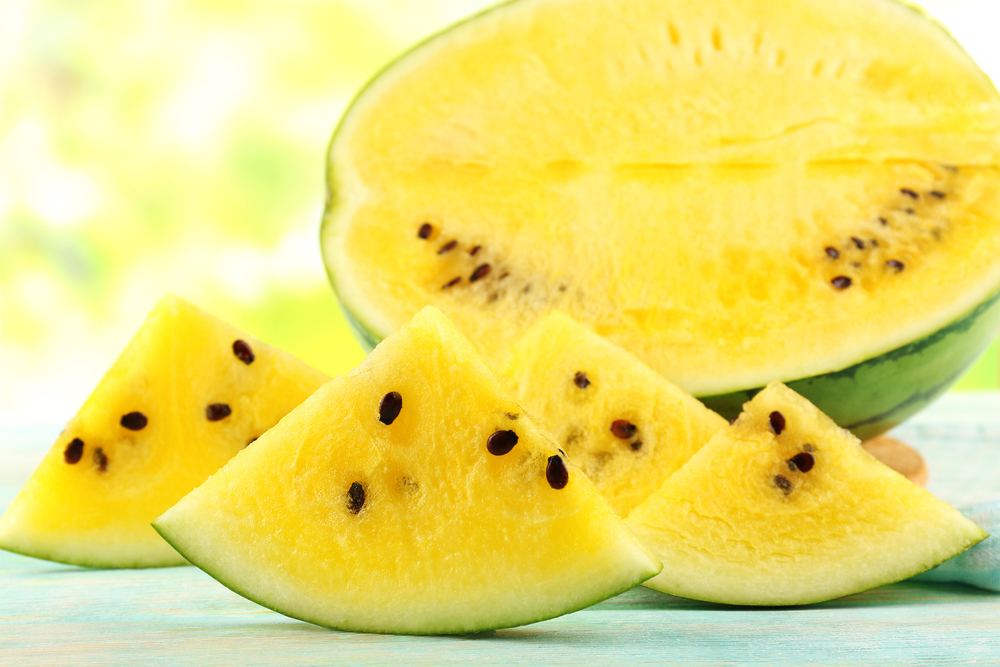
One study of about 500,000 people found that those who regularly ate fruit were 12% less likely to develop diabetes. Diabetics who ate fruit at least three times a week had a reduced risk of complications (by 13–28%) and premature death (by 17%). This may be due to the presence of fiber and other health benefits found in fruits, but more information is needed [6]. nine0003
Melon is 90% water and contains electrolytes: potassium, magnesium, sodium and calcium [1]. This combination helps replenish fluid loss after intense workouts, during illness, or just to keep you hydrated throughout the day.
Melon contains a lot of vitamin C, which is necessary for the production of collagen. This protein helps repair and maintain the skin. It also acts as an antioxidant and can protect against sun exposure [7] [8]. nine0003
Vitamin C is one of the most important components necessary for the proper functioning of the immune system. Studies show that adequate dietary intake of vitamin C can both prevent and treat various respiratory and systemic infections such as pneumonia and the common cold [9].
Studies show that adequate dietary intake of vitamin C can both prevent and treat various respiratory and systemic infections such as pneumonia and the common cold [9].
Its content in one serving of melon (177 g) provides more than half of the daily requirement of vitamin C [1].
Melon contains a lot of fiber: it slows down the absorption of sugar into the blood, promotes normal digestion and the growth of healthy intestinal bacteria [10] [11].
One cup of melon (177 g) contains about 1.5 g of fiber, or about 5% of the daily value. For some people with digestive disorders or those who are starting to introduce fiber into their diets, low-fiber fruits may be better tolerated.
Melon contains lutein and zeaxanthin [12]. These carotenoid compounds are well known for supporting eye health and slowing age-related vision loss. nine0003
Shutterstock
Daria Mikhailova endocrinologist-nutritionist GMS Clinic
How to eat melon with digestive benefits?
“Melon is a product with a high content of carbohydrates that are quickly absorbed, so for people with carbohydrate metabolism disorders and overweight, it is better to consume it not as a single product, but in combination with foods rich in other macronutrients (proteins, fats), for example, as dessert.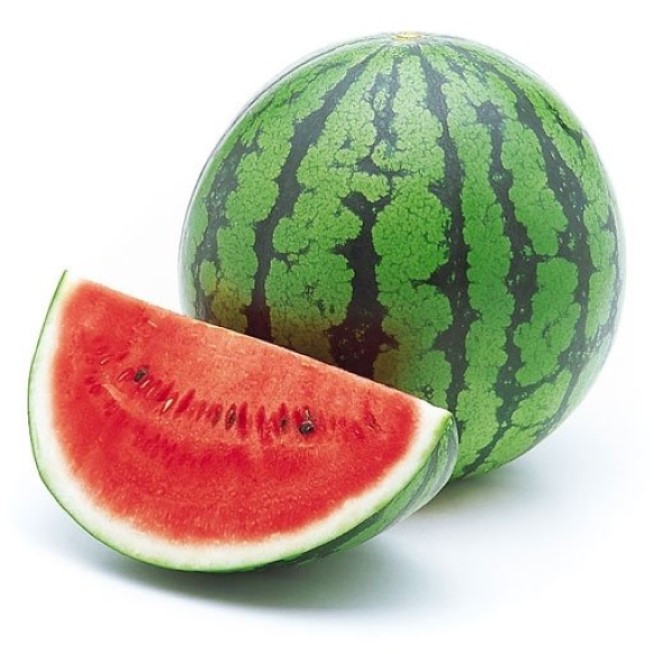 Since melon, like other fruits, contains fiber, people with digestive disorders may experience discomfort after it (bloating, loosening of the stool). In these cases, it is better to limit the consumption of both melons and other fresh fruits and vegetables. nine0003
Since melon, like other fruits, contains fiber, people with digestive disorders may experience discomfort after it (bloating, loosening of the stool). In these cases, it is better to limit the consumption of both melons and other fresh fruits and vegetables. nine0003
To whom is melon contraindicated?
It is undesirable to eat melon for people with carbohydrate metabolism disorders due to the possibility of sharp fluctuations in blood sugar levels. But with good compensation and in combination with other products, it is possible. People with carbohydrate metabolism disorders should not combine it with other high-carbohydrate foods, especially easily digestible ones.
Hovhannes DavidyanPractitioner-therapist, specialist in the field of integrative anti-age medicine “Life Med Center”
“Melon is a rather useful product due to the content of important substances in it. It is rich in calcium, potassium, magnesium, and is also a source of vitamins B9, A, C and folic acid.
Melon removes salts of heavy metals from the body. Potassium, which is contained in melon, strengthens the heart muscle, removes excess fluid from the body and helps reduce swelling. Calcium promotes strong bones and teeth, while magnesium works with neurological issues such as stress. Due to the large amount of fiber, which is also found in melon, food passes through the digestive tract faster, which softens the stool. Based on the performance of such important functions, melon helps to get rid of constipation. nine0003
For some diseases, patients should refuse melon. It is also not recommended for people with diseases of the gastrointestinal tract, with pancreatitis, ulcers or gastritis, since melon juice can irritate the walls of the stomach.
Melon is also contraindicated in diabetic patients. If you immediately eat a melon after a meal, then it, along with the rest of the food, will linger in the stomach, where the fermentation process can take place. This can cause abdominal pain, nausea, flatulence, and in some cases, vomiting.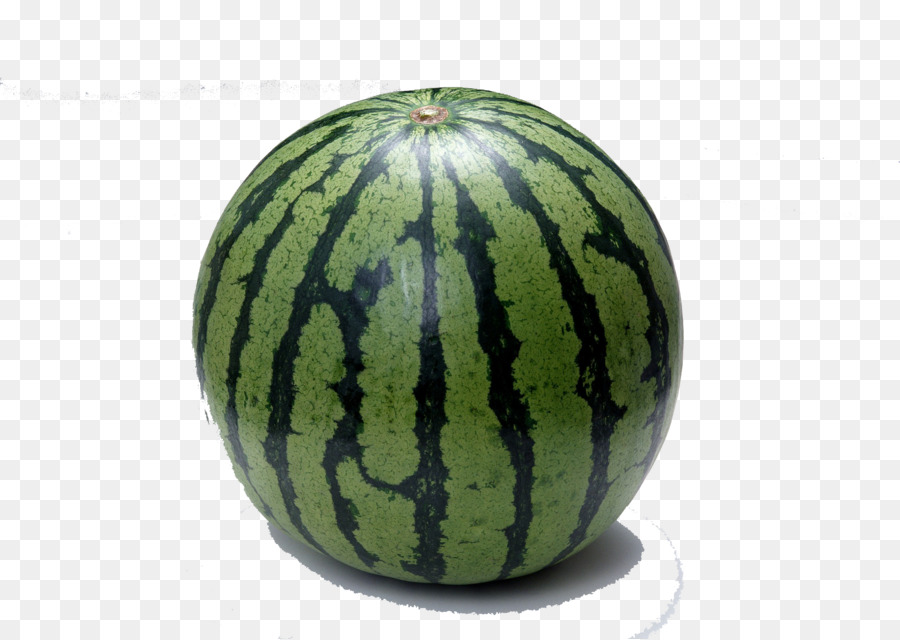 Melon is the product that should be consumed separately from the main meal. It can be classified as heavy food, and when it is in the stomach and gastrointestinal tract, other foods will be less absorbed and not digested properly. Therefore, it is better to eat melon in between meals. nine0003
Melon is the product that should be consumed separately from the main meal. It can be classified as heavy food, and when it is in the stomach and gastrointestinal tract, other foods will be less absorbed and not digested properly. Therefore, it is better to eat melon in between meals. nine0003
It is also not recommended to eat melon on an empty stomach and at bedtime, as evening carbohydrate intake is known to lead to an increased release of insulin and the formation of body fat.
Melon is low in calories and many nutritionists recommend eating it for weight loss. However, along with this, it is important to know that melon contains an increased amount of sugar, so its excessive consumption is not recommended for people with a slow metabolism. Melon also should not be combined with alcohol, honey and dairy products. It is also not recommended for children under three years of age. nine0003
Share
Materials for the article
Authors
Tags
Diana Fastovskaya
taste, but are also considered an indispensable source of vitamins and minerals. “Komsomolskaya Pravda” tells what the health benefits of melon are, and in which case it can be harmful.
“Komsomolskaya Pravda” tells what the health benefits of melon are, and in which case it can be harmful.
Melon seeds were brought to Russia from Central Asia. But if we talk about the history of melon from the very beginning, then for the first time its taste was appreciated in Ancient Egypt.
During the Renaissance, it was grown in the gardens of the Pope. The melon belongs to the melon family (from the Persian “melon” garden, vegetable garden), which also includes watermelon, pumpkin, cucumbers and other products known to us.
Melon has the advantage that the flavored flesh is very low in calories. nine0003
– Melon is a low-calorie, nutrient-rich food – says Heather Mangieri, Dietitian and Nutritionist in Pittsburgh, Lecturer at the Academy of Nutrition and Dietetics . – Due to the high water content, 160 grams of melon contains only 55 calories. This product is able to provide the daily requirement of vitamin A, 50% of the daily requirement of vitamin C, 1.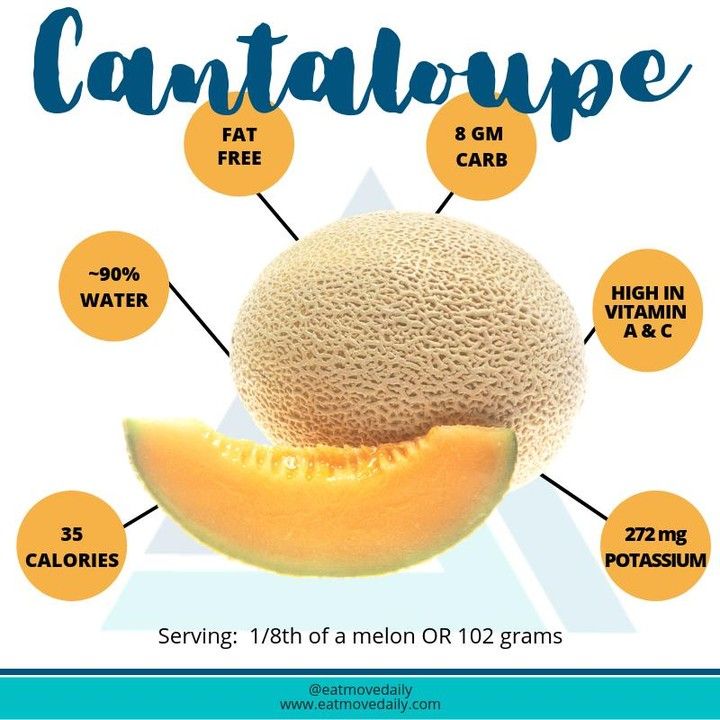 5 grams of fiber and lots of potassium.
5 grams of fiber and lots of potassium.
A study published in 2006 in the journal HortScience found melons to be high in beta-carotene. Beta-carotene is a plant pigment found in fruits and vegetables that are yellow in color and give them a similar color. Despite the bright orange color of, for example, oranges, beta-carotene is much higher in melon. This product is the best source of beta-carotene among all melons. nine0003
Melon is a rich source of vitamins A and C.
— These vitamins are powerful antioxidants. They protect our body from free radicals that can damage DNA molecules and cause inflammatory reactions in the body, says Dr. Mangieri. “Moreover, antioxidants (vitamins A and C) can prevent the development of cancer, cardiovascular and other diseases.
According to the Harvard School of Public Health T.Kh. Chana, eating a diet rich in fruits and vegetables is directly linked to a reduced risk of heart disease and stroke. nine0003 Photo: pixabay.com
nine0003 Photo: pixabay.com
Eating more fruits and vegetables helps maintain visual acuity, protects against the development of cataracts and macular degeneration, the two most common eye diseases that develop with age.
“Vitamin A found in melon is the most beneficial for eyesight,” notes Dr. Mangieri.
The fiber and water contained in the melon help digestion and prevent constipation. nine0201
Learn more
However, according to the Centers for Disease Control and Prevention, melons have been linked to outbreaks of food poisoning over the past 10 to 15 years. Most of these cases are caused by bacterial infections caused by salmonella or E. coli. Several deaths from listeriosis have been reported. nine0003
In one analysis published in the journal Epidemiology and Infection in 2006, researchers found 25 melon-related outbreaks between 1973 and 2003. Outbreaks of infection have covered more than 1,600 people. However, researchers believe that the number of cases was more significant, since not all of the victims sought medical help.
Outbreaks of infection have covered more than 1,600 people. However, researchers believe that the number of cases was more significant, since not all of the victims sought medical help.
Photo: pixabay.com
Similar outbreaks of intestinal infection when eating melons may be due to the fact that the fruit during growth and ripening is in direct contact with the ground, from where bacteria from soil and water can enter it. Moreover, melons and gourds have a rough and thick enough crust, where bacteria can settle. nine0003
Food poisoning is not the only risk of melon consumption. Some people are allergic to ragweed pollen. In this case, when eating melons, an oral allergic syndrome can develop, manifested as a sore throat, itchy lips, and even swelling of the tongue, mucous membranes of the mouth and throat.
These reactions occur because the immune system recognizes the similarity of ragweed pollen allergens to melon proteins.
Melon contains a large amount of antioxidants and vitamins, thanks to which it can have an anti-carcinogenic effect, improve vision, and reduce the risk of cardiovascular diseases. Due to the presence of fiber, melon improves digestion.
Due to the presence of fiber, melon improves digestion.
Melon is most often used as an independent product. It is usually served between meals. The melon is dried, frozen. Preserves, jams, marmalades are prepared, marinated, and also used in the form of juices, cocktails and ice cream. nine0003
In Mediterranean countries, fruit pulp can be served with ham or shrimp. In Italy, it is often consumed with cheeses such as mozzarella.
A simple recipe for a hot summer day
Photo: Pixabay.com
| Meline | |||
| Bold cream (33% and more) | 250 g | 0 | 100 g |
| Mint sprig | for decoration |
Put the cream in the refrigerator to cool. At this time, we clean and cut the melon into small pieces. We send it to a blender and beat until a puree. Pour cold cream into a separate bowl, beat them with a mixer until creamy. While continuing to beat, gradually add the condensed milk.
While continuing to beat, gradually add the condensed milk.
Combine whipped cream with melon puree, mix gently. We shift into an iron form, cover with foil and put in the refrigerator for 7-8 hours. Then we lay out the finished ice cream in vases, decorating with mint leaves. nine0003
Vitamin bomb in 10 minutes
Photo: Pixabay.com
| Meline | 150 G |
| Cryst Avocado | 1 pc. |
| Large orange | 1 pc. |
| mint | several leaves |
| salt, white pepper | to taste |
| sesamens | ½ teaspoon |
| Olive oil | 30 ml |
Peel melon and avocado and cut into large cubes. Peel the orange, get rid of white veins and films, cut into pieces. Combine the ingredients, season with olive oil, add sesame seeds, mix.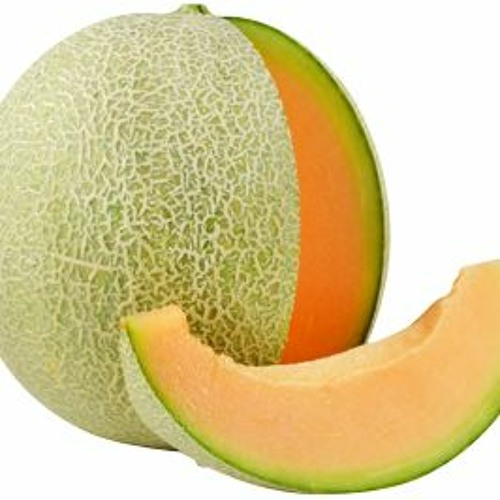 Serve garnished with mint leaves.
Serve garnished with mint leaves.
Share your recipe
Send your signature dish recipe to [email protected] . Komsomolskaya Pravda will publish the most interesting and unusual ideas
Choosing a ripe melon can be tricky because we can’t see it from the inside.
Dr. Mangieri says that the sweetness of melons depends on how fresh they are: the fresher the melon, the sweeter it is. Take a melon in your hands, and if it seems heavier than you expected, then it is ripe. A ripe melon has a special flavor and its rind is slightly pliable when pressed with the thumb.
If you happen to buy a melon that is not ripe enough, you can leave it to ripen at home for a few days. However, do not wash the melon until you are about to cut it. This prevents bacterial growth and premature spoilage of the product. Although the melon will become softer and juicier over time, it will not add sweetness, as it has already been plucked from the garden. nine0003
nine0003
It will not be possible to store such a capricious fruit as a melon for a long time without special conditions. If there are no conditions for storing fruits in a cellar or basement, then it is better to immediately process them into jam or candied fruit.
We have answered some of our readers’ most frequently asked questions about the health benefits of melon.
At night it is better to try not to eat at all – it is desirable that the last meal be at least two hours before bedtime. Melon, among other things, contains a lot of liquid and has a diuretic effect. nine0003
It contains a large amount of folic acid. It is useful for the nervous system, as well as during pregnancy, planning and breastfeeding. Sucrose, glucose and fructose, which are present in large quantities in melon, contribute to brain function and improve memory.
Despite the fact that yellow fruits have been flooding markets and supermarkets almost since the end of May, you should not rush into buying – most likely, such early melons were grown using chemicals, which means that they will not bring much benefit, and even on strong taste is not to be expected.